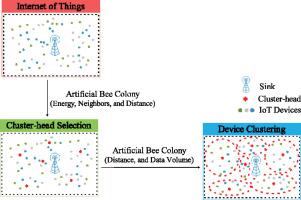当前位置:
X-MOL 学术
›
Comput. Electr. Eng.
›
论文详情
Our official English website, www.x-mol.net, welcomes your
feedback! (Note: you will need to create a separate account there.)
An energy-efficient artificial bee colony-based clustering in the internet of things
Computers & Electrical Engineering ( IF 4.0 ) Pub Date : 2020-09-01 , DOI: 10.1016/j.compeleceng.2020.106733 Shamim Yousefi , Farnaz Derakhshan , Hadi S. Aghdasi , Hadis Karimipour
Computers & Electrical Engineering ( IF 4.0 ) Pub Date : 2020-09-01 , DOI: 10.1016/j.compeleceng.2020.106733 Shamim Yousefi , Farnaz Derakhshan , Hadi S. Aghdasi , Hadis Karimipour

|
Abstract Wireless communication on the Internet of Things (IoT) requires context-aware data transmission protocols. Developing an energy-efficient clustering mechanism is the primary challenge in data transmission over IoT. The existing approaches struggle with the short lifetime of IoT, imbalance load distribution, and high transmission delay. This paper proposes a novel cluster-head selection and clustering mechanism on IoT. It is composed of two main phases. The first phase selects the near-optimal cluster-heads using Artificial Bee Colony (ABC) algorithm. Performance criteria include the residual energy of the devices, the number of neighbors, Euclidean distance between devices and the sink, and Euclidean distance between each device and its neighbors. The principal objective of the second phase is to group devices into some clusters based on Euclidean distance between each cluster-head and its members, and the data volume generated by clusters. Simulation results verify that our mechanism improves energy consumption, lifetime, and transmission delay.
中文翻译:

基于节能人工蜂群的物联网聚类
摘要 物联网 (IoT) 上的无线通信需要上下文感知的数据传输协议。开发节能的集群机制是物联网数据传输的主要挑战。现有方法面临物联网寿命短、负载分配不平衡和传输延迟高的问题。本文提出了一种新的物联网簇头选择和聚类机制。它由两个主要阶段组成。第一阶段使用人工蜂群 (ABC) 算法选择接近最优的簇头。性能标准包括设备的剩余能量、邻居的数量、设备和接收器之间的欧几里德距离以及每个设备与其邻居之间的欧几里德距离。第二阶段的主要目标是根据每个簇头与其成员之间的欧几里德距离以及簇产生的数据量将设备分组到一些簇中。仿真结果验证了我们的机制改善了能耗、寿命和传输延迟。
更新日期:2020-09-01
中文翻译:

基于节能人工蜂群的物联网聚类
摘要 物联网 (IoT) 上的无线通信需要上下文感知的数据传输协议。开发节能的集群机制是物联网数据传输的主要挑战。现有方法面临物联网寿命短、负载分配不平衡和传输延迟高的问题。本文提出了一种新的物联网簇头选择和聚类机制。它由两个主要阶段组成。第一阶段使用人工蜂群 (ABC) 算法选择接近最优的簇头。性能标准包括设备的剩余能量、邻居的数量、设备和接收器之间的欧几里德距离以及每个设备与其邻居之间的欧几里德距离。第二阶段的主要目标是根据每个簇头与其成员之间的欧几里德距离以及簇产生的数据量将设备分组到一些簇中。仿真结果验证了我们的机制改善了能耗、寿命和传输延迟。











































 京公网安备 11010802027423号
京公网安备 11010802027423号